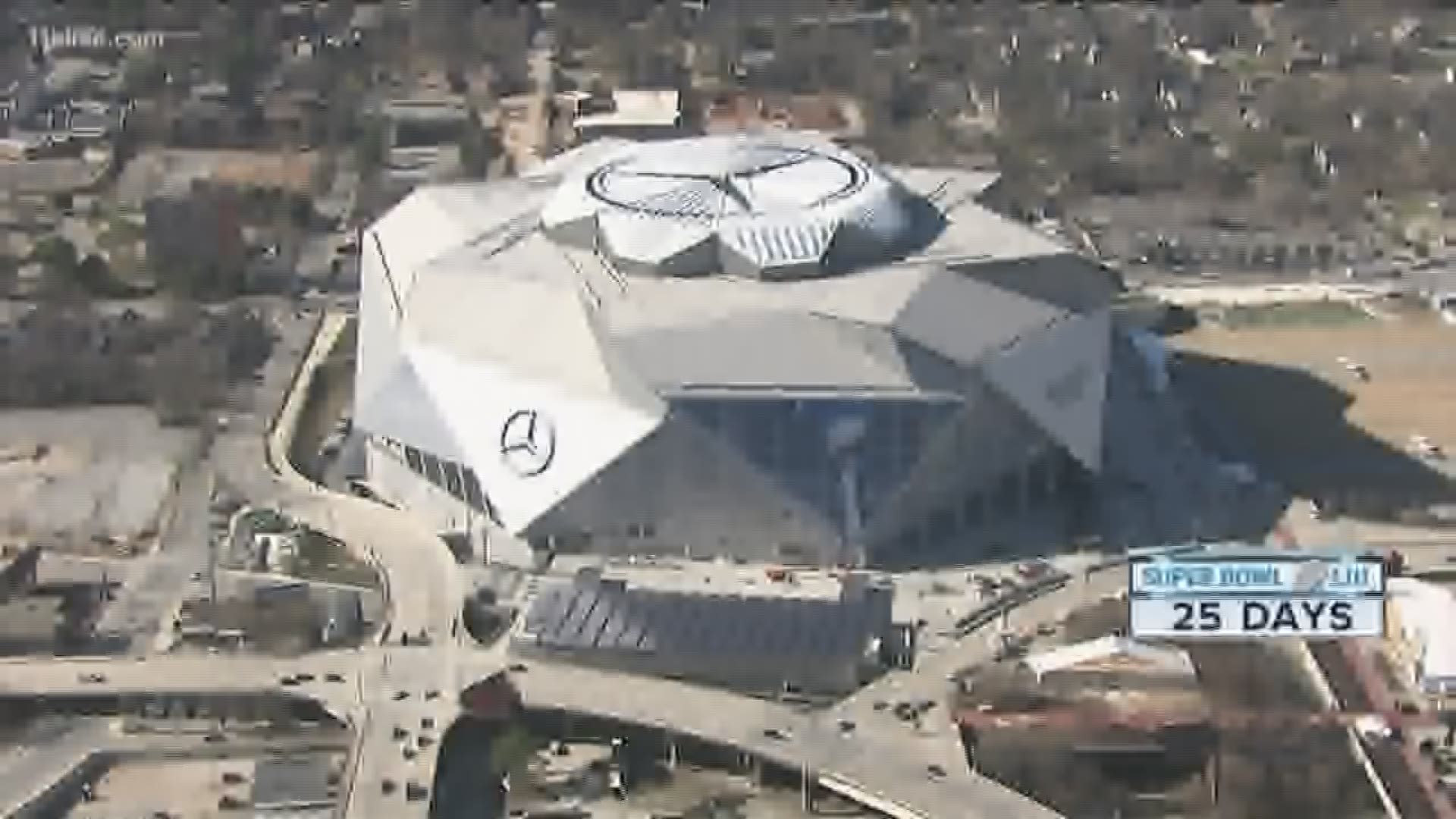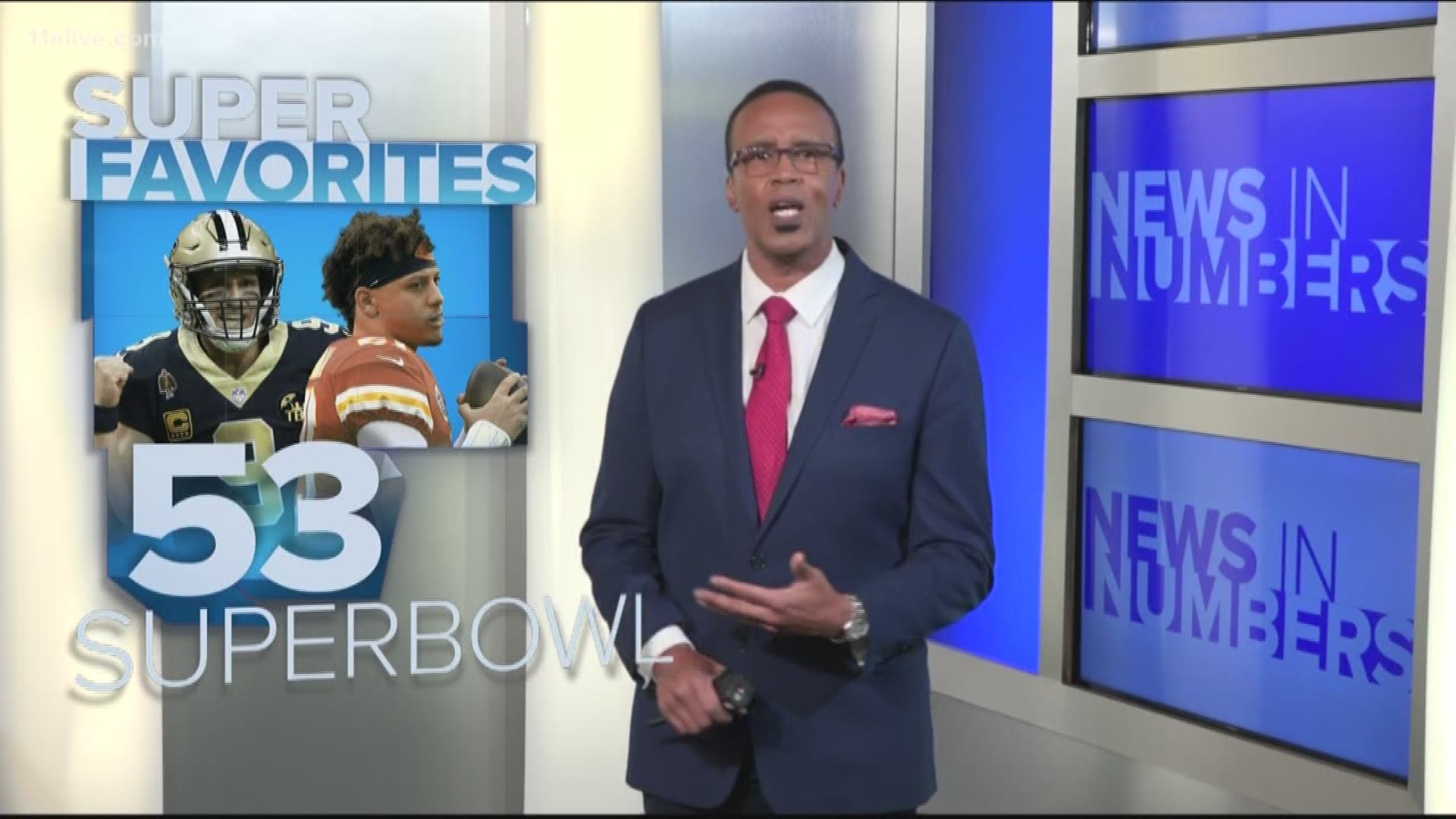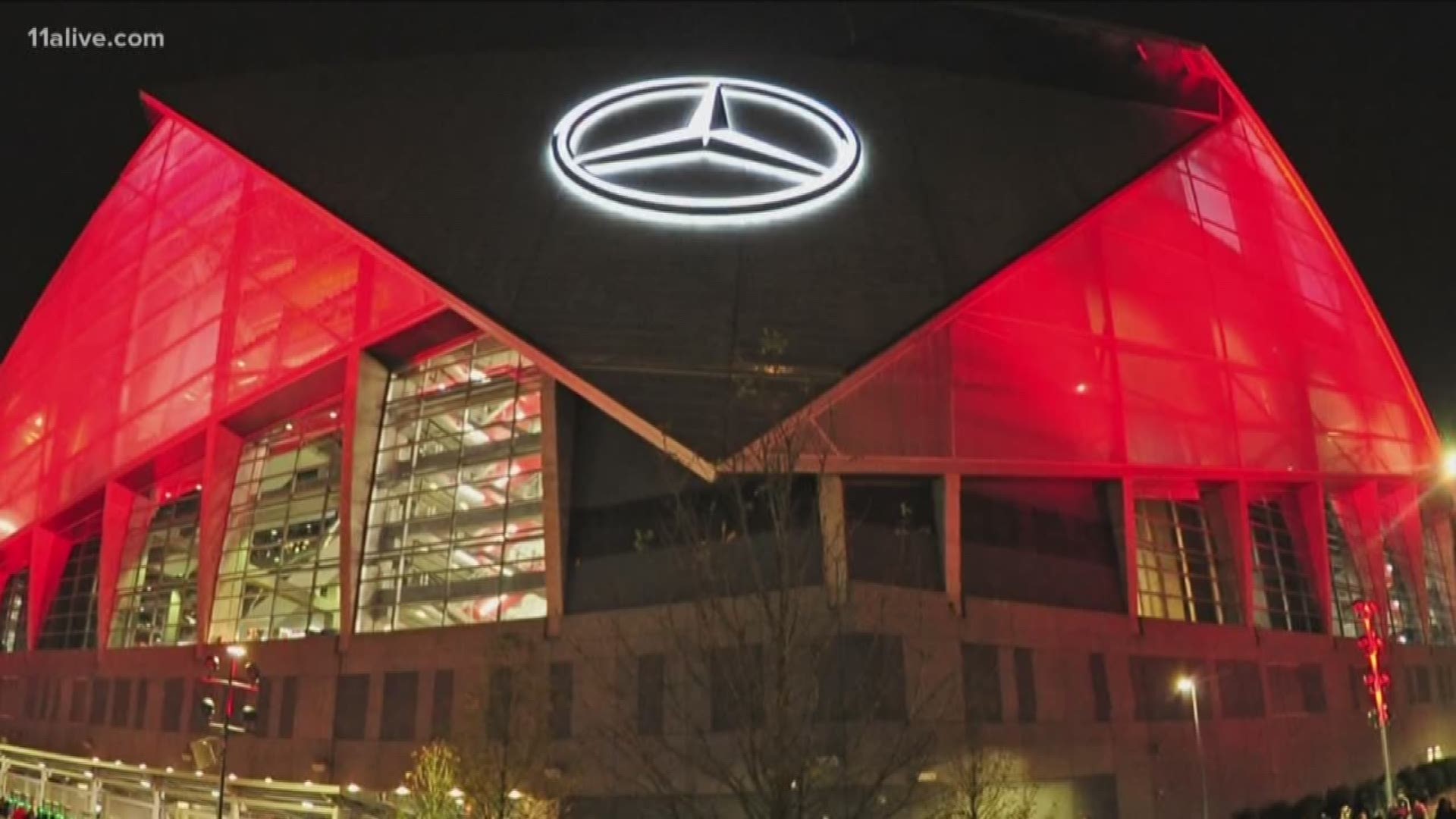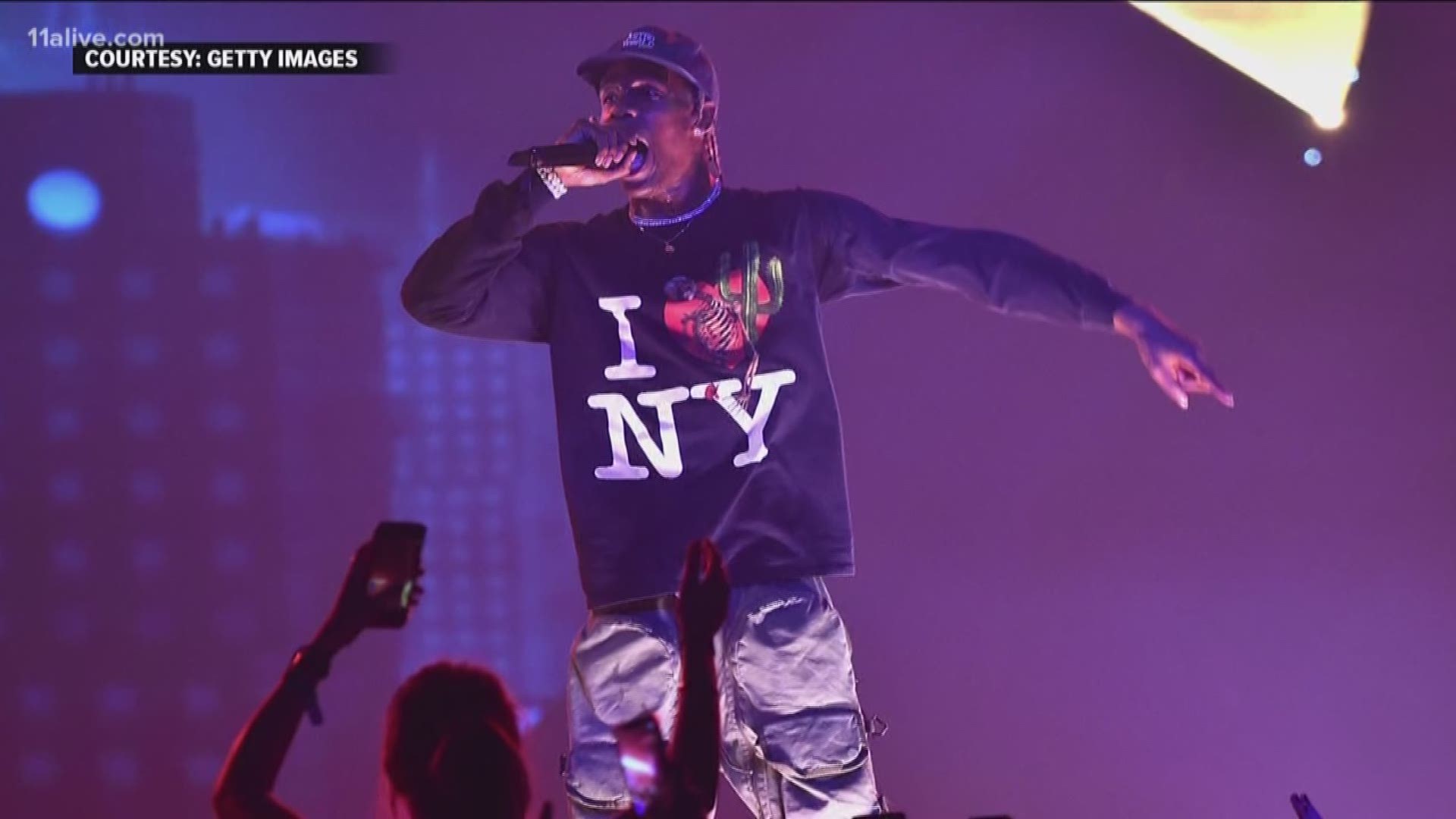ATLANTA — The city of Atlanta will host its third Super Bowl on Feb. 3, with Mercedes-Benz Stadium serving as the venue for Super Bowl LIII.
The previous two Super Bowls took place at the since-demolished Georgia Dome, culminating the 1993 and 1999 seasons.
What can be explained for the 19-year gap between hosting duties for Atlanta?
There are two modes of thinking:
a) Atlanta typically has serene weather during the winter months; but timing-wise, the previous two Super Bowls coincided with blustery temperatures and icy conditions, thus diminishing the excitement for a third Super Bowl in Georgia.
b) NFL owners had been waiting for the Atlanta Falcons to move into a new, world-class facility; and Mercedes-Benz Stadium (opened in 2017) satisfied this requirement.
Consequently, Atlanta might soon join the so-called 'Super Bowl rotation' of popular hosting cities: New Orleans, Miami, Indianapolis (preferred cold-weather option), Houston, Phoenix, Dallas and Los Angeles (Rams and Chargers will move into a $3 billion stadium in 2020).
11Alive Sports offers a capsule review of Super Bowl history in Atlanta:
SB XXVIII: DALLAS-BUFFALO
FOR HISTORY SAKE
a) This clash (January 1994) marked the first-ever immediate repeat of a Super Bowl matchup. The previous year, the Cowboys crushed the Bills by five touchdowns (52-17), ushering in the first world championship of the Jimmy Johnson/Jerry Jones era in Dallas.
b) The Cowboys became the first team in history to start the season at 0-2 and win the Super Bowl.
PRELUDE TO A CHAMPIONSHIP
As mentioned above, Dallas started the 1993 campaign on a sour note, getting crushed by Washington in Week 1 and then falling to Buffalo at home, due to a late Bills interception at the goal line.
The common thread for both defeats: The Cowboys didn't have access to tailback Emmitt Smith, who was holding out for a market-setting contract.
The good news: After Dallas fell to 0-2, an angry mob of players demanded that owner Jerry Jones find a creative way to get Smith back into the fold.
A few days later, Smith signed a four-year, $13 million deal, which at the time represented the highest payout to an NFL running back (trumping Barry Sanders' extension).
From there, the Cowboys went 12-2 to finish the regular season, highlighted by an overtime victory against the Giants (Week 18) to clinch the NFC East title; and during the playoffs, Dallas clobbered Green Bay and San Francisco by double-digit spreads, respectively, to clinch the Super Bowl berth in Atlanta.
Like Dallas, Buffalo also posted a 12-4 record during the regular season and clinched home-field advantage throughout the playoffs.
However, aside from two midseason clunkers against the Steelers and Chiefs, the Bills were never in doubt of reaching the postseason.
The playoff roads were relatively smooth, with the Bills outlasting the Raiders and Chiefs to clinch yet another conference crown.
The franchise's biggest worry at the time: Becoming the only team in NFL history to lose four consecutive Super Bowls.
SUPER SUNDAY
The Bills enjoyed a productive start in the Super Bowl, relying on a 10-0 swing in the second quarter and grabbing a 13-6 halftime lead.
But ay the rub: Buffalo had thoroughly outplayed Dallas in the first 30 minutes, but only had a seven-point lead to show for it.
The consequential worry: The Cowboys would find their footing in the second half, if the Bills didn't have a killer instinct.
Sure enough, less than one minute into the third quarter, the game incurred a wild momentum swing, with Bills tailback and future Hall of Famer Thurman Thomas getting stripped of a carry ... allowing for Cowboys safety James Washington to recover and return the ball for a 46-yard touchdown.
This set the table for Emmitt Smith carrying the Cowboys offense, especially since quarterback Troy Aikman was still dealing with a concussion from two weeks prior.
(The NFL rules for handling concussions were very different back then. Aikman played on Super Sunday, amid minimal public outrage.)
After a so-so first half, Smith established himself as an untamed battering ram, collecting 34 total touches (30 carries), 158 total yards (132 rushing) and two touchdowns, while powering Dallas to the 30-13 victory.
With the win, the Cowboys became the fifth franchise to capture back-to-back Lombardi trophies (the Steelers accomplished this twice in the 1970s). In time, it would also represent Jimmy Johnson's final game as the Dallas coach.
(Johnson and Jerry Jones would 'mutually' part ways two months later.)
SB XXXIV: ST. LOUIS-TENNESSEE
FOR HISTORY SAKE
a) The 1999 St. Louis Rams became the first team of the Super Bowl era to post four or fewer wins one season (1998) ... and then capture the Lombardi Trophy the following year.
b) Quarterback Kurt Warner established then-Super Bowl records for passing attempts (45) and passing yards (414).
PRELUDE TO A CHAMPIONSHIP
The 1999 Rams were seemingly on the brink of a major turnaround during that preseason, after handing the play-calling duties to a little-known offensive assistant (Mike Martz) and signing free-agent quarterback Trent Green the previous March.
But the Rams' worst nightmare occurred in August, when Green went down with a season-ending knee injury against the Chargers.
The only other in-house option for Dick Vermeil's Rams: Tapping then-unknown backup Kurt Warner as the starting quarterback.
How did Warner repay that trust from the coaching staff? He became the first quarterback in NFL history to amass at least 275 yards passing and three touchdowns in his first four career starts (all Rams victories).
With the ascensions of Warner, future Hall of Famer Marshall Faulk (traded to St. Louis on Draft Day) and rookie Torry Holt, the Rams morphed into the NFL's most explosive offense overnight.
The famous moniker: The Greatest Show On Turf.
By season's end, Warner (4,353 yards passing, 41 TDs) would cruise to NFL MVP honors, while carrying St. Louis to a 13-3 record and home-field advantage throughout the NFC playoffs.
For the postseason, the Rams gutted out a pair of victories over the Vikings (49-37) and Buccaneers (11-6) to post the franchise's first return trip to the Super Bowl in 20 years.
On the AFC side, Tennessee (13-3) reached the NFL postseason as a wild-card entrant, thus requiring the Titans to win three games during the playoffs. They pulled off the task with victories over the Bills (home), Colts (home) and Jaguars (home).
Funny thing about No. 1 seed Jacksonville. For the 1999 season, the Jaguars incurred three total defeats that year (including the playoffs) ... but to just one franchise (Titans).
SUPER SUNDAY
"Atlanta" had become a curse word with the media throughout Super Bowl Week, thanks to another unexpected cold snap, which led to icy conditions while driving around the city.
But all was forgiven on game day, after the Rams and Titans provided NFL fans with a classic finish.
With the teams knotted at 16 with under two minutes remaining, Warner broke the tie in heroic fashion, hitting receiver Isaac Bruce for a 73-yard touchdown down the right side.
The only problem here? Bruce left enough time for the Titans to march down the field.
As such, quarterback Steve McNair valiantly led Tennessee's offense into St. Louis territory, using an array of QB scrambles and effective mid-range throws to put the Titans in point-blank range for the end zone.
The result: One of the most glorious (or heartbreaking) endings in Super Bowl history.
With the ball on the Tennessee 10 on the game's final play, McNair hit Kevin Dyson on a perfect slant route ... but as Dyson headed for the end zone, St. Louis linebacker Mike Jones halted the receiver's progress at the 1-yard line.
Game over.
By the smallest of margins, St. Louis secured the first (and only) Lombardi Trophy for Dick Vermeil.





